新目标英语九年级unit10 全单导学案(定0
- 格式:doc
- 大小:315.50 KB
- 文档页数:12
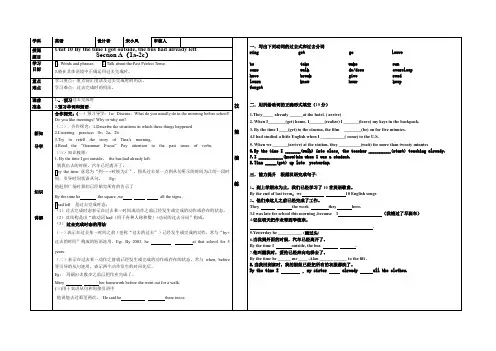
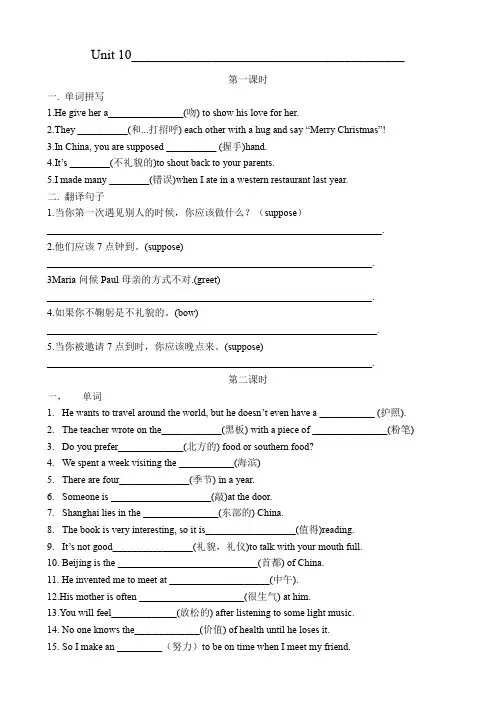
Unit 10_________________________________________第一课时一. 单词拼写1.He give her a_______________(吻) to show his love for her.2.They __________(和...打招呼) each other with a hug and say “Merry Christmas”!3.In China, you are supposed __________ (握手)hand.4.It’s ________(不礼貌的)to shout back to your parents.5.I made many ________(错误)when I ate in a western restaurant last year.二. 翻译句子1.当你第一次遇见别人的时候,你应该做什么?(suppose)___________________________________________________________________.2.他们应该7点钟到。
(suppose)_________________________________________________________________.3Maria问候Paul母亲的方式不对.(greet)_________________________________________________________________.4.如果你不鞠躬是不礼貌的。
(bow)__________________________________________________________________.5.当你被邀请7点到时,你应该晚点来。
(suppose)_________________________________________________________________.第二课时一,单词1.He wants to travel around the world, but he doesn’t even have a ___________ (护照).2.The teacher wrote on the____________(黑板) with a piece of _______________(粉笔)3.Do you prefer_____________(北方的) food or southern food?4.We spent a week visiting the ___________(海滨)5.There are four______________(季节) in a year.6.Someone is ____________________(敲)at the door.7.Shanghai lies in the _______________(东部的) China.8.The book is very interesting, so it is__________________(值得)reading.9.It’s not good________________(礼貌,礼仪)to talk with your mouth full.10. Beijing is the ____________________________(首都) of China.11. He invented me to meet at ____________________(中午).12.His mother is often _____________________(很生气) at him.13.You will feel_____________(放松的) after listening to some light music.14. No one knows the_____________(价值) of health until he loses it.15. So I make an _________(努力)to be on time when I meet my friend.二翻译句子1. 我们珍惜平日生活中和家人、朋友在一起的时光。
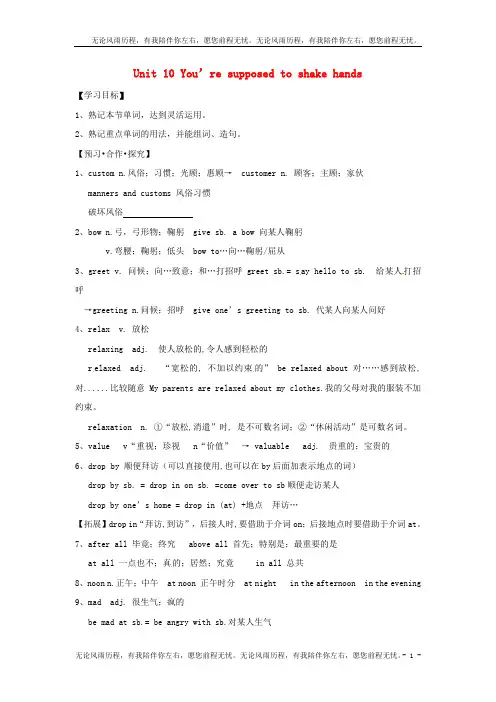
Unit 10 You’re supposed to shake hands【学习目标】1、熟记本节单词,达到灵活运用。
2、熟记重点单词的用法,并能组词、造句。
【预习•合作•探究】1、custom n.风俗;习惯;光顾;惠顾→ customer n. 顾客;主顾;家伙manners and customs 风俗习惯破坏风俗2、bow n.弓,弓形物;鞠躬 give sb. a bow 向某人鞠躬v.弯腰;鞠躬;低头bow to…向…鞠躬/屈从3、greet v. 问候;向…致意;和…打招呼 greet sb.= s ay hello to sb. 给某人打招呼→greeting n.问候;招呼give one’s greeting to sb.代某人向某人问好4、relax v. 放松relaxing adj. 使人放松的,令人感到轻松的r elaxed adj. “宽松的, 不加以约束的” be relaxed about 对……感到放松, 对......比较随意My parents are relaxed about my clothes.我的父母对我的服装不加约束。
relaxation n. ①“放松,消遣”时, 是不可数名词;②“休闲活动”是可数名词。
5、value v“重视;珍视 n“价值”→ valuable adj. 贵重的;宝贵的6、drop by 顺便拜访(可以直接使用,也可以在by后面加表示地点的词)drop by sb. = drop in on sb. =come over to sb顺便走访某人drop by one’s home = drop in (at) +地点拜访…【拓展】drop in“拜访,到访”,后接人时,要借助于介词on;后接地点时要借助于介词at。
7、after all 毕竟;终究 above all 首先;特别是;最重要的是at all 一点也不;真的;居然;究竟 in all 总共8、noon n.正午;中午 at noon 正午时分 at night in the afternoon in the evening9、mad adj. 很生气;疯的be mad at sb.= be angry with sb.对某人生气be mad abo ut sth 对…着迷get mad 大动肝火;气愤10、effort n.努力;尽力 make an effort to do sth 尽力做……spare no effort to do sth 不遗余力去做某事11、chalk n.粉笔 a piece of chalk 一根粉笔v.用粉笔写、画 Chalk down the song on the blackboard.把这首歌抄在黑板上。
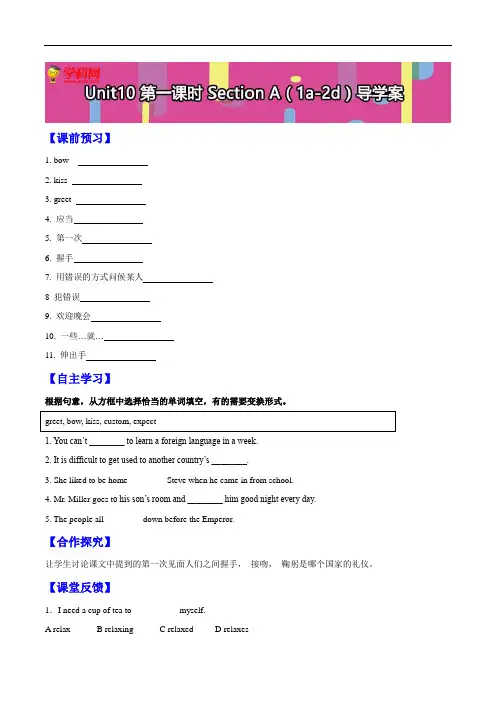
【课前预习】1. bow2. kiss3. greet4. 应当5. 第一次6. 握手7. 用错误的方式问候某人8 犯错误9. 欢迎晚会10. 一些…就…11. 伸出手【自主学习】根据句意,从方框中选择恰当的单词填空,有的需要变换形式。
greet, bow, kiss, custom, expect1. You can’t ________ to learn a foreign language in a week.2. It is difficult to get used to another country’s ________.3. She liked to be home ________ Steve when he came in from school.4. Mr. Miller goes t o his son’s room and ________ him good night every day.5. The people all ________ down before the Emperor.【合作探究】让学生讨论课文中提到的第一次见面人们之间握手,接吻,鞠躬是哪个国家的礼仪。
【课堂反馈】1.I need a cup of tea to __________ myself.A relaxB relaxingC relaxedD relaxes2. The teacher pointed _______ the blackboard and said,“You must look carefully.”A outB atC toD in3.Confucius once said ,“Everything has beauty, ___________not everyones ees it. ”A. butB. orC. and4. Study hard, _ _ you will pass the exam.A. soB. orC. butD. and5. Teachers are supposed _______ all the students alike.A. to treatB. treatC. treats6. Y ou’re not _______to walk on the grass. We should learn to protect it.A. supposedB. supposeC.supposing。
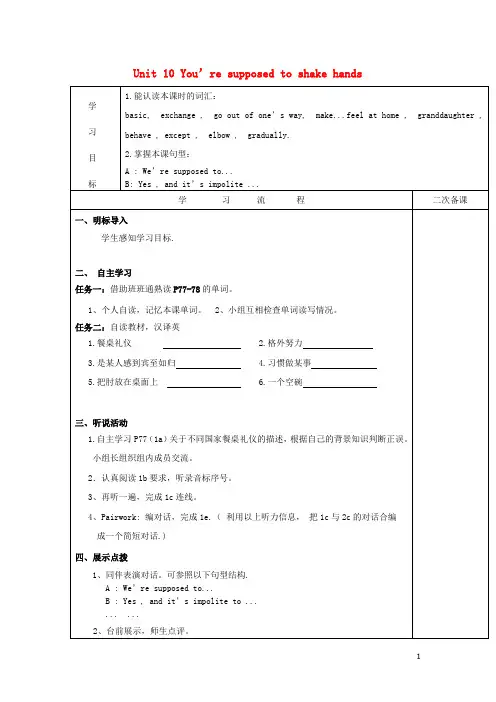
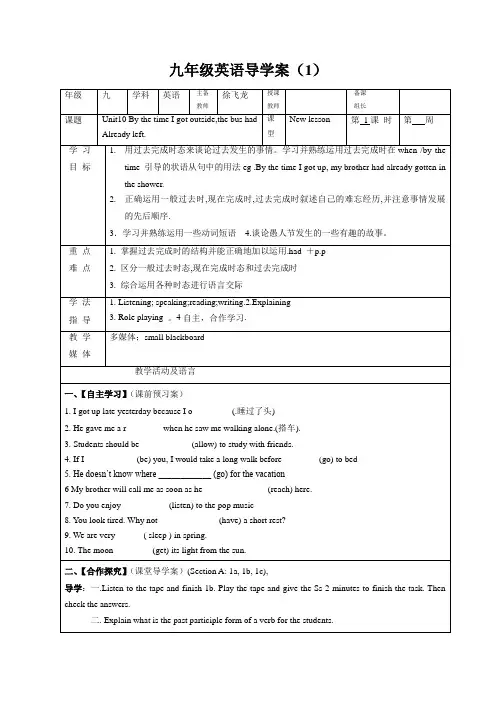
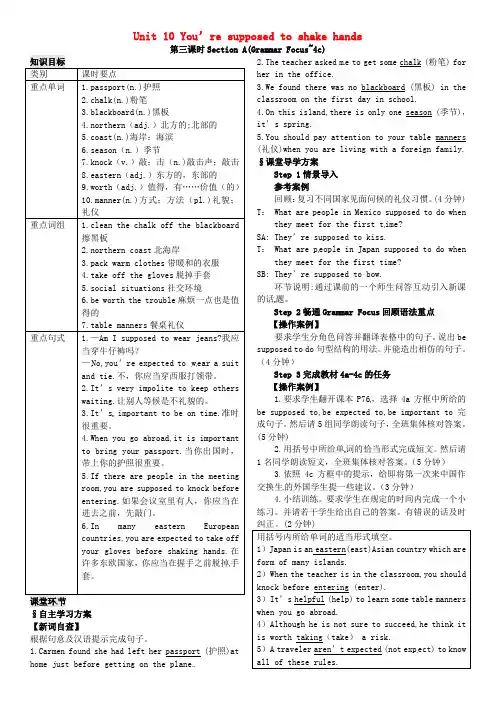
Unit 10 You’re supposed to shake hands 第三课时Section A(Grammar Focus~4c)知识目标类别课时要点重点单词 1.passport(n.)护照2.chalk(n.)粉笔3.blackboard(n.)黑板4.northern(adj.)北方的;北部的5.coast(n.)海岸;海滨6.season(n.)季节7.knock(v.)敲;击(n.)敲击声;敲击8.eastern(adj.)东方的,东部的9.worth(adj.)值得,有……价值(的)10.manner(n.)方式;方法(pl.)礼貌;礼仪重点词组 1.clean the chalk off the blackboard 擦黑板2.northern coast北海岸3.pack warm clothes带暖和的衣服4.take off the gloves脱掉手套5.social situations社交环境6.be worth the trouble麻烦一点也是值得的7.table manners餐桌礼仪重点句式 1.—Am I supposed to wear jeans?我应当穿牛仔裤吗?—No,you’re expected to w ear a suitand tie.不,你应当穿西服打领带。
2.It’s very impolite to keep otherswaiting.让别人等候是不礼貌的。
3.It’s important to be on time.准时很重要。
4.When you go abroad,it is importantto bring your passport.当你出国时,带上你的护照很重要。
5.If there are people in the meetingroom,you are supposed to knock beforeentering.如果会议室里有人,你应当在进去之前,先敲门。
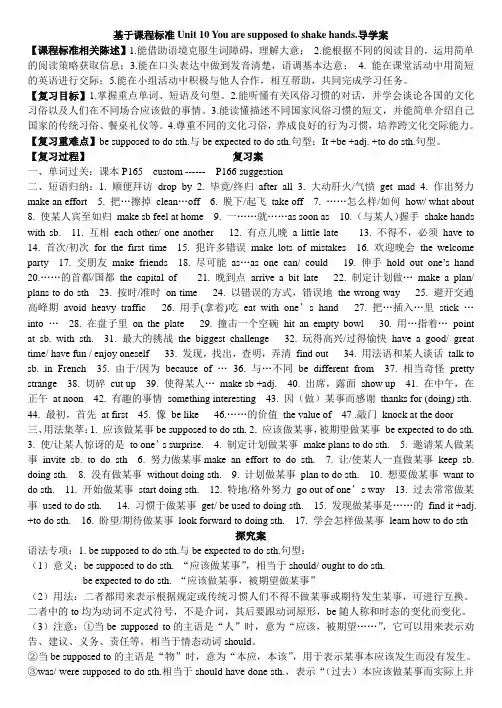
基于课程标准Unit 10 You are supposed to shake hands.导学案【课程标准相关陈述】1.能借助语境克服生词障碍,理解大意;2.能根据不同的阅读目的,运用简单的阅读策略获取信息;3.能在口头表达中做到发音清楚,语调基本达意; 4. 能在课堂活动中用简短的英语进行交际;5.能在小组活动中积极与他人合作,相互帮助,共同完成学习任务。
【复习目标】1.掌握重点单词、短语及句型。
2.能听懂有关风俗习惯的对话,并学会谈论各国的文化习俗以及人们在不同场合应该做的事情。
3.能读懂描述不同国家风俗习惯的短文,并能简单介绍自己国家的传统习俗、餐桌礼仪等。
4.尊重不同的文化习俗,养成良好的行为习惯,培养跨文化交际能力。
【复习重难点】be supposed to do sth.与be expected to do sth.句型:It +be +adj. +to do sth.句型。
【复习过程】复习案一、单词过关:课本P165 custom ------ P166 suggestion二、短语归纳:1. 顺便拜访drop by 2. 毕竟/终归after all 3. 大动肝火/气愤get mad 4. 作出努力make an effort 5. 把…擦掉clean…off 6. 脱下/起飞take off 7. ……怎么样/如何how/ what about 8. 使某人宾至如归make sb feel at home 9. 一……就……as soon as 10. (与某人)握手shake hands with sb. 11. 互相each other/ one another 12. 有点儿晚a little late 13. 不得不,必须have to 14. 首次/初次for the first time 15. 犯许多错误make lots of mistakes 16. 欢迎晚会the welcome party 17. 交朋友make friends 18. 尽可能as…as one can/ could 19. 伸手hold out one’s hand 20.……的首都/国都the capital of 21. 晚到点arrive a bit late 22. 制定计划做…make a plan/ plans to do sth 23. 按时/准时on time 24. 以错误的方式,错误地the wrong way 25. 避开交通高峰期avoid heavy traffic 26. 用手(拿着)吃eat with one’s hand 27. 把…插入…里stick …into …28. 在盘子里on the plate 29. 撞击一个空碗hit an empty bowl 30. 用…指着…point at sb. with sth. 31. 最大的挑战the biggest challenge 32. 玩得高兴/过得愉快have a good/ great time/ have fun / enjoy oneself 33. 发现,找出,查明,弄清find out 34. 用法语和某人谈话talk to sb. in French 35. 由于/因为because of …36. 与…不同be different from 37. 相当奇怪pretty strange 38. 切碎cut up 39. 使得某人…make sb +adj. 40. 出席,露面show up 41. 在中午,在正午at noon 42. 有趣的事情something interesting 43. 因(做)某事而感谢thanks for (doing) sth.44. 最初,首先at first 45. 像be like 46.……的价值the value of 47 .敲门knock at the door三、用法集萃:1. 应该做某事be supposed to do sth. 2. 应该做某事,被期望做某事be expected to do sth.3. 使/让某人惊讶的是to one’s surprise.4. 制定计划做某事make plans to do sth.5. 邀请某人做某事invite sb. to do sth6. 努力做某事make an effort to do sth.7. 让/使某人一直做某事keep sb. doing sth.8. 没有做某事without doing sth.9. 计划做某事plan to do sth. 10. 想要做某事want to do sth. 11. 开始做某事start doing sth. 12. 特地/格外努力go out of one’s way 13. 过去常常做某事used to do sth. 14. 习惯于做某事get/ be used to doing sth. 15. 发现做某事是……的find it +adj. +to do sth. 16. 盼望/期待做某事look forward to doing sth. 17. 学会怎样做某事learn how to do sth探究案语法专项:1. be supposed to do sth.与be expected to do sth.句型:(1)意义:be supposed to do sth. “应该做某事”,相当于should/ ought to do sth.be expected to do sth. “应该做某事,被期望做某事”(2)用法:二者都用来表示根据规定或传统习惯人们不得不做某事或期待发生某事,可进行互换。
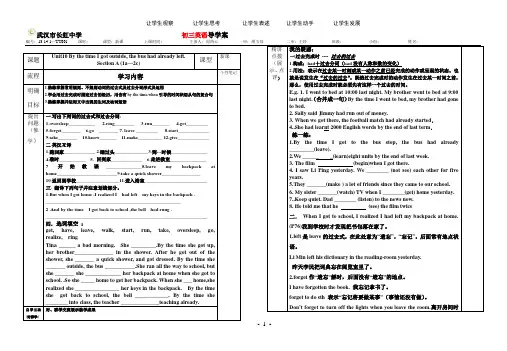
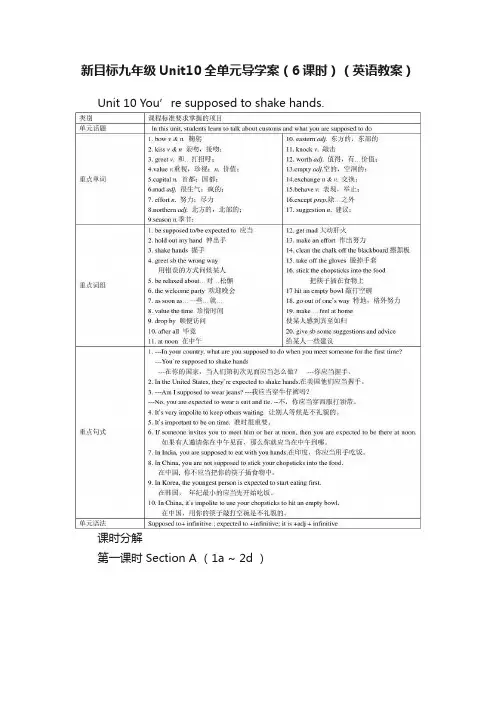
新目标九年级Unit10全单元导学案(6课时)(英语教案)Unit 10 You’re supposed to shake hands.课时分解第一课时 Section A (1a ~ 2d )II. 课堂环节§自主学习方案【自学自查】根据句意及首字母提示完成单词。
1. He always made some mistakes when he was a little boy.2. People in Korea often bow when they meet for the first time.3. In China, people often shake hands when they meet in the street.4. What are you supposed to do when you meet someone?5. It ’s our custom to greet people by giving th em flowers. §课堂导学方案 Step 1 情景导入Teacher: When you are new to a place, you need to know about some special customs the place has. You need to ask some one about them. What should you say first? Questions: Teacher: In you country, ___________when you meet someonefor the first time?Students: You are supposed to shake hands / kiss / bow.① what are you supposed to do? ② what should you do? ……环节说明:通过课前的一个师生问答互动引入新课的话题Step 2 完成教材1a-1c 的任务【操作案例】1. 要求学生看课本P75 1a 部分的图片。
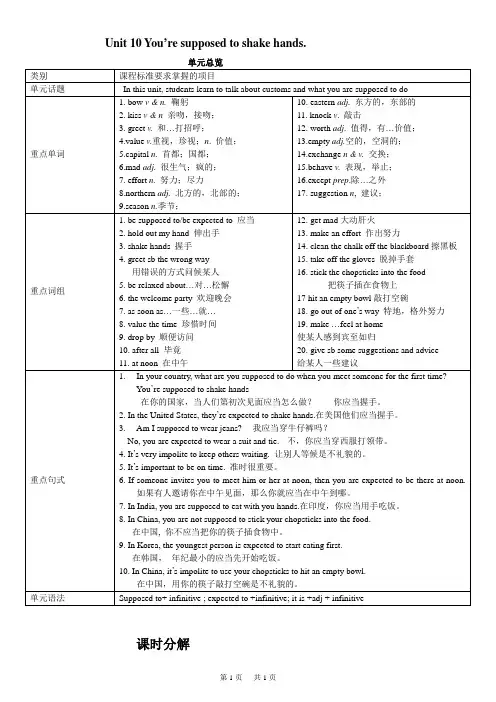
Unit 10 You’re supposed to shake hands.课时分解第一课时 Section A (1a ~ 2d )II. 课堂环节 §自主学习方案 【自学自查】根据句意及首字母提示完成单词。
1. He always made some mistakes when he was a little boy.2. People in Korea often bow when they meet for the first time.3. In China, people often shake hands when they meet in the street.4. What are you supposed to do when you meet someone?5. It ’s our custom to greet people by giving them flowers. §课堂导学方案 Step 1 情景导入Teacher: When you are new to a place, you need to know about some special customs the place has. You need to ask some one about them. What should you say first? Questions:Teacher: In you country, ___________when you meet someone for the first time?Students: You are supposed to shake hands / kiss / bow.① what are you supposed to do? ② what should you do? ……环节说明:通过课前的一个师生问答互动引入新课的话题Step 2 完成教材1a-1c 的任务 【操作案例】1. 要求学生看课本P75 1a 部分的图片。
Topic Unit10You’re supposed to shake hands. Section A 1a—2d (听说课)(3) bow 的用法向某人鞠躬/低头可表示为: bow to sb3 Pair work in 1c4 听录音,完成1b、2a和2b.5分角色表演2d并背诵.6.当堂检测:一根据汉语意思填空。
1.In Japan, the people are supposed to _________(鞠躬) when they meet for the time.2.It's not polite ____________(亲吻) the others in public in China.3.I was supposed to arrive at 8:00, but I (到达) at 9:00.4.When we meet Americans for the first time, we should _________(握手)with them.5.You must know some __________(习俗) before you go to some foreign countries. 二单项选择()1. Jim stood up and shook hands ____________ both of them.A. byB. WithC. forD. to()2. Chinese never bowed ____________the enemiesA. inB. toC. onD. with()3. John _______ Beijing the day before yesterday.A. arrived atB. arrivedC. reached toD. arrived in()4. You ________stand in line when waiting for the bus.A. mustn’tB. can’tC. are supposed toD. don’t()5. People in China ________when they meet for the first time.A. bowB. kissC. shake handsD. laugh7. 小结:III. Post-class1.预习下一课时。
Unit10 You’re supposed to shake hands.Section A(1a--2c)【学习目标】——心中有了明确的目标,您就会走向成功1.掌握1a-2c的词语;2.学习不同国家在不同场合有不同的风俗习惯,知道在这些场合应该怎么做;3.学会使用句型You’re supposed/expected to do sth..【学习重难点】——突出重点,突破难点重点:1.在不同的国家,第一次见面应该怎么做。
2.正确使用句型You’re supposed/expected to do sth./It is+adj.+动词不定式. 难点:2b Listen and fill in the blanks.【导学流程】一、【自学】——学会自学,您将技高一筹!请根据所给汉语,用单词的适当形式完成句子1.Different countries have different _____________(风俗).2.She_________(亲吻)him and said goodbye.3.People in Korea____________(鞠躬)when they meet for the first time.4.People in __________(巴西)like to watch football games very much.5.They are supposed to shake hands when people in _________(墨西哥) meet for the first time.6.Maria ____________(问候)Paul’s mother the wrong way.二、【交流】——共同探究,不依附,不从众,让思考成为习惯!1.Talk about some customs in different countries when people meet for the first time with actions according to 1a.2.Listen and check the answers in 1a to finish 1b.3.Make conversations about what people in different countries are supposed to do when they meet for the first time.4.Finish the tasks in 2a and 2b after listening.5.Role-play a conversation between Maria and Dan by using the information in 2a and 2b.三、【释疑】--仔细阅读,你会明白很多1.be supposed to do sth. 被期望做某事,应该做......1)当主语是人时,表示劝告、建议、责任等,=should =to be expected to do sthYou are supposed to___________( arrive) on time2)当主语是物时,表示“本应;本该”The train was supposed to arrive half an hour ago.be supposed to 与 should:(1) be supposed 是 suppose 一词的___________ 语态结构。
Unit 10 You’re supposed to shake hands.课时分解第一课时 Section A (1a ~ 2d )II. 课堂环节 §自主学习方案 【自学自查】根据句意及首字母提示完成单词。
1. He always made some mistakes when he was a little boy.2. People in Korea often bow when they meet for the first time.3. In China, people often shake hands when they meet in the street.4. What are you supposed to do when you meet someone?5. It ’s our custom to greet people by giving them flowers. §课堂导学方案 Step 1 情景导入Teacher: When you are new to a place, you need to know about some special customs the place has. You need to ask some one about them. What should you say first? Questions:Teacher: In you country, ___________when you meet someone for the first time?Students: You are supposed to shake hands / kiss / bow.① what are you supposed to do? ② what should you do? ……环节说明:通过课前的一个师生问答互动引入新课的话题Step 2 完成教材1a-1c 的任务 【操作案例】1. 要求学生看课本P75 1a 部分的图片。
Un it 10 Youre supposed to shake hands九年级(英语)学科导学案九年级(英语)学科导学案九年级(英语)学科导学案九年级(英语)学科导学案九年级(英语)学科导学案九年级(英语)学科导学案预习一、关于林月在法国的经历的文早。
二、文中语言占:八、、•go out one ' sway to do ,,make , feel athome , get usedto doi ng , becomfortabledoing ,三、3a表格。
任务一、了解林月在法国的经历。
1. 读文章,回答2b中的问题。
2. 读2c句子,将画线词语用方格中的短语替换。
3. 读文早,填写表格。
考察学生对文章的细节的理解,培养了学生的语篇分析能力。
任务二、精读文早。
1. 翻译文章。
2. 找出文中语言点。
任务三、完成写作框架。
、1. 让学生速读文早,完成2b问题。
2. 解读2c要求,指导学生完成2c。
带领全班核对答案。
3. 解读2d表格要求,让学生完成2d,带领全班核对答案。
、1. 让学生翻译文章,在学生理解文章过程中,教师对较难句子做出解释。
2. 让学生找出重点短语。
并帮助学生理解这些短语用法。
三、1. 让学生理解3a要求。
2. 让学生列出所了解的中国的风俗礼仪。
、1. 读文章,回答2b中的问题。
2. 读2c句子,将画线词语用方格中的短语替换。
全班核对答案。
3. 理解2d表格要求,填写表格。
全班核对答案。
_、1. 翻译文章。
2. 找出重点短语。
记好笔记。
三、1. 理解3a要求。
2. 列出你所了解的中国的风俗礼仪。
3. 展示所填写的内容。
有个别学生对文章中知识点的用法掌握不好,教师精讲。
九年级(英语)学科导学案。
Unit 10 You’re supposed to shake hands【学习目标】1、语法:1) be supposed to do的用法2) It is + adj. to do sth2、重难点:主要谈论东西方的风俗习惯的差异【预习•合作•探究】1、 In your country, what are you supposed to do when you meet someone for the first time?【解析1】be suppo sed to do sth 被期望做某事,应该做......1)当主语是人时,表示劝告、建议、责任等=should = be expected to do sthYou are supposed to___________( arrive) on time2)当主语是物时,表示“本应;本该”The train was supposed to arrive half an hour ago.【拓展】:be supposed to 与should(1) be supposed是suppose一词的___________ 语态结构。
后接动词不定式,相当于___________ .后接不定式.即:_______________ . 使用较随便,建议性强。
否定式为be not supposed to do sth.例:To keep safe, drivers aren’t supposed to drink before driving.A. aren’t willing toB. shouldn’tC. aren’t sure toD. don’t have to(2)should后接动词______ ,属于_______ 语态形式,使用起来较严肃和正式;You are not supposed to shake hands.= You s houldn’t shake hands.你不应与之握手。
Uint10 By the time I got outside ,the bus had already left.编制:杨红审查:学科主任:【单元教学目标】一、学习目标(Language Goal)1. 学习并掌握如何叙述过去发生的事2. 学习并掌握过去完成时,并能用过去完成时谈论过去发生的事3. 学习并熟练运用过去完成时在when /by the time 引导的状语从句中的用法4. 学习并熟练运用一些动词短语5. 学习并熟练运用一般过去时,现在完成时和过去完成时二、语言结构(Language Structures)掌握“By the time I got outside, the bus had already left.”句型,通过练习和运用加以巩固三、目标语言(Target Language)1、掌握过去完成时的用法;2、学会谈论过去发生的事情,会使用以下基本句子:By the time I got outside, the bus had already left.Have you ever been to …… ? Yes, I have.What happened to David on April Fool’s Day?四、重点词汇(Key words and phrases)by the time 到…时候为止get outside 到外边get to school 到学校get up 起床get into the shower 去洗澡get home 到家start doing / to do sth. 开始做某事be late for 迟到go off (闹钟)闹响wake up 醒来come out 出来,出现run off 迅速离开,跑掉on time 准时in time 及时come by (走)过来give sb. a ride 让某人搭车break down 损坏,坏掉show up 出席,露面stay up 熬夜 a costume party 一个化装舞会sth. happen to sb.某人发生了某事so …that … 如此…以至于set off 出发,开始April Fool's Day 愚人节get married 结婚/marry sb. 与某人结婚both…and…二者…都…get dressed 穿好衣服on the first day 在第一天五、重点、难点(Key points and difficulties)1.Past perfect Tense 过去完成时构成:had+过去分词(had没有人称和数的变化)过去完成时可以表示过去某一时刻或某一动作之前完成的动作或呈现的状态。
也就是说发生在“过去的过去”。
e.g. I had finished my homework before supper.我在晚饭前把作业做完了。
By the end of last year Henry had collected more than one thousand foreign stamps.When we got there, the football match had already started.2.when 和by the time引导的时间状语从句by the time 到……时候为止,when当……时候,从句用一般现在时,主句为过去完成时。
e.g. By the time she got up, her brother had already gone into the bathroom.到她起床的时候,她的弟弟已经去洗澡间了。
When she got to school, she realized she had left her backpack at home当她到学校的时候,她意识到她把书包放在家里了。
3. How to narrate past events.如何描述过去的事件描述过去的事件,首要注意一点是时态。
由于事情发生在过去,因此一定要用过去的某种时态。
表示过去的时态有:(1)一般过去时:结构:动词的过去式(2)过去进行时:结构:was / were +现在分词(3)过去完成时:结构:had+过去分词(4)过去将来时:结构:would+动词原形六、情感目标1、通过本单元学习使学生更加了解世界各地;2、通过对本单元的学习,熟悉了解不及时做某事而造成的危害培养学生养成良好的行为习惯。
七、课时安排7课时课时分配:第1课时:整体自学导学案第2课时:Section A (听说达标1)第3课时:Section A (语言综合运用及提高)第4课时:Section B (听说达标1)第5课时: Section B (语言综合运用及提高)第6课时Self-check第7课时:单元知识整合及运用第1课时:Section A (听说达标1)【学习目标】1、Section A: 1a, 1b, 1c, 2a, 2b, Grammar focus2. 进行听力强化训练. 能够进行听力内容转述。
知识目标:1、能运用以下句型进行交际:By the time I got outside, the bus had already left.When I got to school, I realized I had left my backpack at home.2、掌握词汇及短语:get outside, get to school, by the time, start doing, be late for技能目标:学会并掌握如何运用过去完成时叙述过去发生的事情听懂听力材料并能对话掌握过去分词情感目标:做事加强连续性,有条不紊【课前准备】Choose an author as you choose a friend. 选书如择友。
Without a friend the world is a wilderness. 没有朋友,世界就等於一片荒野。
A bosom friend afar brings distant land near. 海内存知己,天涯若比邻。
【自主学习案】:I. 写出下列动词的过去式和过去分词。
go ____________ ____________ get ____________ ____________leave ____________ ____________ come ____________ ____________take ____________ ____________ wake ____________ ____________give ____________ ____________ make ____________ ____________break ____________ ____________ ring ____________ ____________ II. 在课本中找出下列短(词)语,写出其汉语意思。
1.by the time ____________2.oversleep ____________3.leave her backpack at home ___________4.get in the shower ___________III、请看1a 中的5幅图片,想想下面2个问题W h a t d o y o u u s u a l l y d o i n t h e m o r n i n g b e f o r e s c h o o l?D o y o u l i m e m o r n i n g?W h y o r w h y n o t?IV、把1a图片与词组连接在一起1.take a shower 2 she overslept 3 run quickly 4 the bus left 5 left her backpack at home1【群学学案】:I. 听1b,完成以下选择题。
()1. Who look stressed out? A. Gina B. Tina C. Amy D. Peter()2. What happened to her in the morning?A. played basketball.B. oversleptC. forgot the homeworkD. had a cold()3. what’s the right order about her activities in the morning?A. ran to school , took a quick shower, overslept, realized she had left her backpack.B. ran to school , overslept, realized she had left her backpack., took a quick showerC. took a quick shower , ran to school , took a quick shower , realized she had lefther backpack.D. overslept, took a quick shower, ran to school, realized she had left her backpack. II.听1b录音填空1). By the time I got up, my brother____ already ______ in the shower.2)By the time I got outside, the bus ________ already _________.3). When I got to school, I realized I _____ ______ my backpack at homeIII、听两遍录音,完成下面短文。
Tina had a terrible morning yesterday.She _______ .When she got up, __________________. By the time she_________,the bus _____________. So she hadto________________.Oh,dear_________________________________IV、Pair work: 根据1b信息,仿照1c对话,两人一组,试着练习下面的句型,A: What happened this morning?B: I overslept. And by the time I got up, my brother had already finished hisV、观察2a的四幅图并进行描述,再听2a录音,将2a中的图片按正确顺序排列。